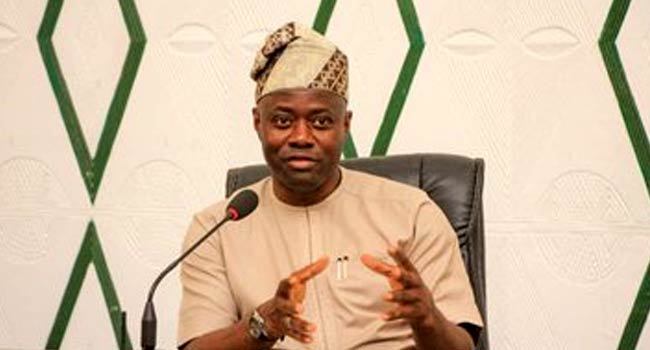The Governor of Oyo State, Seyi Makinde, has disclosed that the Independent Power Project (IPP) undertaken by the state will power the Government House and other critical state assets including schools, hospitals, streetlights, and stadium.
The Governor spoke at a special thanksgiving service held at First Baptist Church, Igbojaye, Itesiwaju Local Government Area, Oyo State.
He added that his administration would continue to leverage the four comparative advantages of Oke Ogun and the state generally, which includes agribusiness, tourism, solid minerals, and commerce.
According to the statement released by the Chief Press Secretary to the Governor, Mr. Taiwo Adisa, the governor was quoted telling critics to always assess the performance of his administration based on his electoral promises.
He said, “Concerning the power project we are embarking on in Ibadan, they have been criticising us. They said the 11 megawatts project does not make any sense because it will only power the Government House. Let me say here today that they need to do more research. It is not only Government House that it will power but all the streetlights within 10km radius, hospitals, schools, Judiciary Complex and the stadium will be powered.
“On my way here, I have seen the poles meant for the light-up project in Igbo-Ijaye. We will ensure we power the project with gas generators here. And when the light comes, darkness will definitely vanish and that is the essence of the project.”
The governor asked critics to evaluate his performance based on his electoral promises saying, “For us in Oyo State, we are saying you should evaluate us based on what we said we would do and whether we are doing them or not.”
He said that his administration had continued to leverage the comparative and competitive advantages of each zone of the state.
He added, “In Oyo State, we have both comparative and competitive advantages in about four areas. One is agribusiness. When we went to Brent Farm at Ijio, the owner said that from the survey, the area is the most fertile in Nigeria, and it is the same for most places in Oke-Ogun. So, if we talk about competitive and comparative advantages in agribusiness, Oke-Ogun has a place.
“The second area is solid minerals and Oke-Ogun will also feature when we talk about the development of solid minerals. Another aspect is tourism. The hanging lake, which is at Ado-Awaye, is a perfect example and the Oke-Ogun zone will feature too. The deepest gorge dam on the entire continent of Africa is at Ikere. So, this zone will also feature as far as tourism is concerned.
“The last is commerce. Oyo State shares an international border, which is between Ibarapa and Oke-Ogun axis. So, Oke-Ogun also features in commerce. So, as a government, if we want to lead our people from poverty to prosperity like we mentioned in our roadmap for accelerated development, we have to focus on those areas.
“And what exactly are those things we need to do? We need to develop our infrastructure and that is why, six months into this government, we awarded the Moniya-Iseyin road. If we also talk about commerce, Saki is almost the furthermost city in Oyo State, which is closer to the border with the Republic of Benin. That was why we focused on completing the Saki township road, which is done right now.
“Let me also say that there are other zones that have one or two things they can contribute to the development of our state. Talk of Ogbomoso, Oyo and others. We have started the construction of Oyo-Iseyin road, passing through Fasola. Fasola is our agribusiness hub and the same thing in Ibadan. If you are coming from Lagos and going to North or East or other parts of the South-West, you will pass through Ibadan.
So, Ibadan is almost the centre of Commerce for the entire South West. That is why we are saying anybody who is passing through Ibadan should have a good experience and want to come back. Those are some of the steps that this government has taken to ensure that we are expanding our economy and I’m very sure we are on the path of taking many of our people out of poverty.”
He also appreciated the clerics and the people for what he called their consistent prayers, adding that without the prayers, “we won’t be where we are today.”













